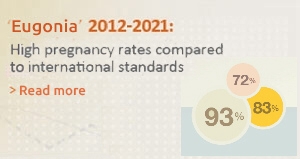Polycystic ovary syndrome (PCOS) is the most common endorine condition in women of reproductive age and also the most common ovulation disorder. Dispite huge progress in detecting and treating PCOS the cause of the condition is complicated and not well understood.
Young women with PCOS can exhibit metabolic disorders, such as insulin resistance, which have been linked to type 2 diabetes later on in life. The main problem caused by PCOS is ovulation anomalies and therefore infertility. Even so, many women with PCOS have normal cycles and go on to conceive naturally. One study, however, found that 75% of women with PCOS had ovulation disorders and infertility, while abnormal cycle lengths and/or anovualtion was present in 80% of PCOS women (Van Santbrink et al., 1997).
Treatment
In 2007 in Thessaloniki, an international consensus was reached regarding treatment strategies for PCOS. A first option for treatment is the use of clomifene citrate to induce ovulation. A second choice is gonadotropin administration if the first option fails. Gonadotropin administration must be monitored closely, due to the risk of ovarian hyperstimulation (OHSS). Metformin administration can lower insulin levels, but this method is no longer recommended. Finally, weight loss and physical exercise are highly recommended, as they increase the effectiveness of treatment and alleviate some of the symptoms, such as type 2 diabetes.
IVF is the most effective method of dealing with the infertility associated with PCOS. Use of GnRH analogues (agonists and antagonists), combined with gonadotropins in order to undergo IVF can lead to very high pregnancy rates, while close monitoring is required to minimise the risk of OHSS. Women with PCOS undergoing IVF are much more likely to develop OHSS than women without PCOS. OHSS can become a serious health concern if not dealt with properly. At Eugonia we are world leaders in OHSS prevention and treatment and have contributed significantly to modern international strategies of OHSS management. We have published the largest study regarding women with PCOS that have undergone IVF and found that the use of a flexible GnRH antagonist protocol is related to significantly lower incidence of OHSS compared to the older long protocol, while maintaining high pregnancy rates. Therefore an antagonist protocol can be considered as the best option for women with PCOS undergoing IVF.






























